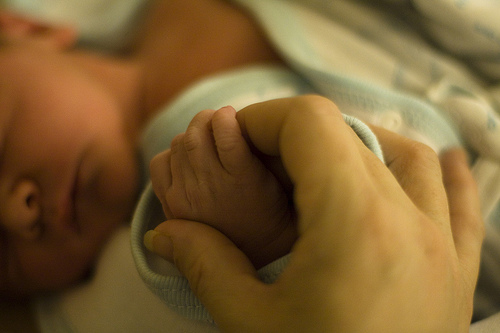New parents are often taken by surprise by their newborn baby’s sleep patterns. Parents may wonder whether their baby is sleeping enough, or find themselves questioning how much day versus night sleep they should be getting.
With the overabundance of information telling you how much sleep your baby should be getting (and the health risks if they don’t), many parents become overwhelmed and anxious very early on. I’m here to tell you: please stop worrying. Newborn sleep is variable and there is a WIDE range on the spectrum of how much or how little your baby will sleep.
Newborn Sleep Cycles
In the first few months of life, newborns will sleep in cycles during a 24-hour period, with no differentiation between day and night. Sleep will take time to mature into more normal patterns and until it does, there is no need for you to worry. Statistics show that newborns should sleep an average of 15-16 hours per day and parents begin to panic when they tally up their baby logs and find that their baby is not falling within those ranges.
 Here’s a little secret: In actuality, there are numerous studies. Some studies show that babies can sleep as little as 10 hours a day (in a 24 hour period), or as much as 18 hours per day during these newborn months, Feeding methods have no bearing on how much or how little your baby sleeps, so don’t trick yourself into thinking that by switching to formula or adding rice cereal you will somehow tilt the scales in your favor and nudge your baby into that 18 hour range. Your newborn will sleep as much as he needs to and will get the amount of sleep that his body requires.
Here’s a little secret: In actuality, there are numerous studies. Some studies show that babies can sleep as little as 10 hours a day (in a 24 hour period), or as much as 18 hours per day during these newborn months, Feeding methods have no bearing on how much or how little your baby sleeps, so don’t trick yourself into thinking that by switching to formula or adding rice cereal you will somehow tilt the scales in your favor and nudge your baby into that 18 hour range. Your newborn will sleep as much as he needs to and will get the amount of sleep that his body requires.
Now, this information may make you feel better for a newborn minute (HA!), but then you begin to wonder WHEN will my baby start sleeping like a normal human being (a.k.a. an adult)? Newborn sleep cycles are much shorter in the early months. In fact, naps and nighttime sleep won’t even begin to evolve until they get a little older.
Waking every few hours is normal for your newborn (and essential to his survival), as he needs to eat frequently and wake as a means to have his primary needs met. The good news is that to a certain extent, your infant will naturally move towards longer stretches of sleep by 3 to 4 months.
Nighttime Sleep
Thankfully, nighttime stretches start to consolidate around 6 to 8 weeks. This doesn’t mean that your sweet baby will start logging 12 hours of sleep at night. Newborns will sleep in stretches of three to four hours, and sometimes as little as 20-30 minutes, before stirring or waking (which explains all those short naps). By 6 to 8 weeks you will notice a slightly longer stretch of sleep consolidated during the night (possibly up to 4 to 6 hours).
Your newborn’s naps will begin to organize later, usually sometime between 12 to 16 weeks of age. Before this time, there will be little consistency to how long each nap will be so don’t become anxious about your baby being a poor napper during this time. Sleep is about your baby’s maturity, and also requires a bit of nurturing on the parent’s part.
If you have any questions about your newborn’s sleep, be sure to check out Gentle Baby Solutions, a community built specifically for parents of newborns!
 Heather Irvine is a Certified GSC, Postpartum Doula, Newborn Care Specialist & Certified Lactation Counselor. As if those specialties weren’t enough, she also has 5 (yes, 5!!) children of her own!
Heather Irvine is a Certified GSC, Postpartum Doula, Newborn Care Specialist & Certified Lactation Counselor. As if those specialties weren’t enough, she also has 5 (yes, 5!!) children of her own!
How much does your newborn sleep?
photo credit: storyvillegirl via photopin cc




